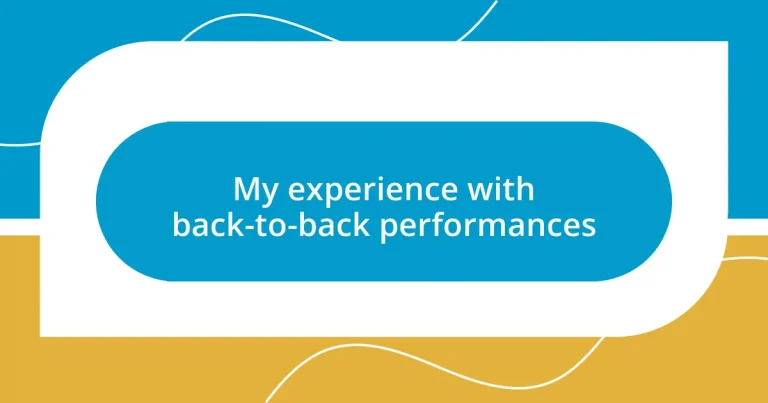Key takeaways:
- Successful back-to-back performances require a balance of energy management, strategic preparation, and mental resilience to avoid burnout.
- Incorporating mindfulness techniques, such as visualization and positive self-talk, enhances performance quality and emotional stability.
- Setting realistic goals, embracing flexibility during challenges, and practicing self-compassion contribute to improved performance experiences and personal growth.
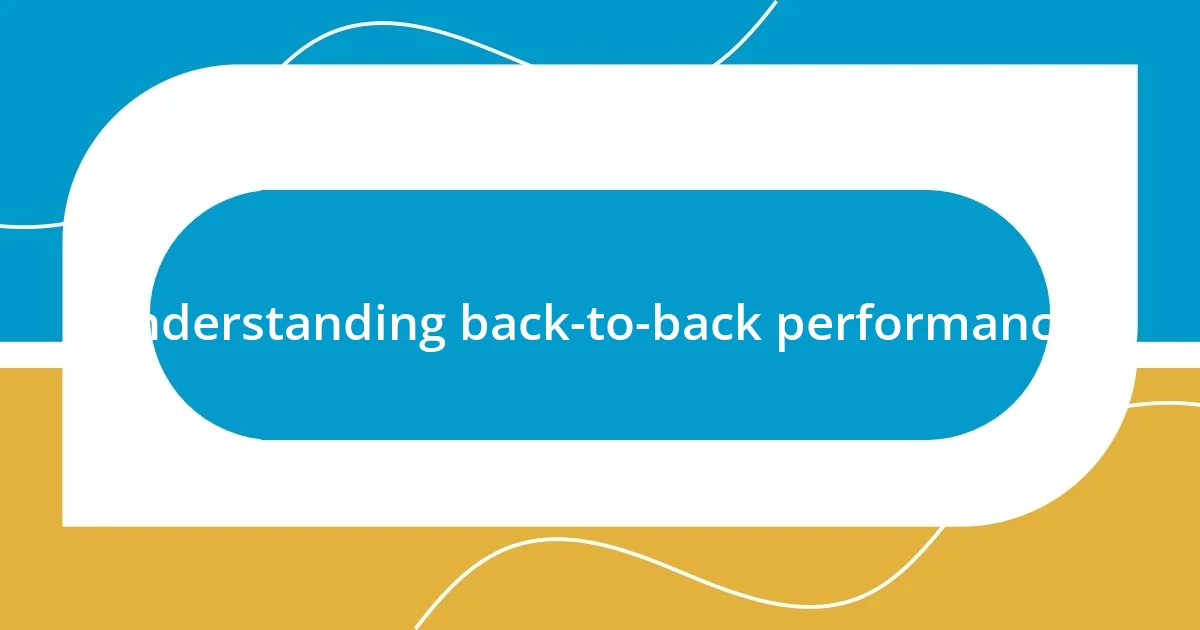
Understanding back-to-back performances
Back-to-back performances can be exhilarating yet demanding. I remember the adrenaline coursing through me during a weekend gig where I performed three shows in a row. The thrill of stepping onto stage after stage can be unmatched, but it made me question: How can one sustain such energy without burning out?
In my experience, each performance feels unique, yet the pressure mounts when they’re stacked together. There’s this palpable sense of urgency to deliver, to captivate the audience, even when fatigue starts to creep in. I often find myself reflecting on whether I’m truly giving my best with each act or if I’m just riding on the momentum of the previous performance.
When you’re caught in that back-to-back whirlwind, the physical toll is one aspect, but the emotional and mental challenges are equally significant. Imagine juggling the excitement of performing while grappling with nerves and exhaustion simultaneously. Have you ever felt both exhilarated and drained? It’s in those moments of dichotomy that I’ve learned the importance of mindfulness and finding my center amid the chaos.
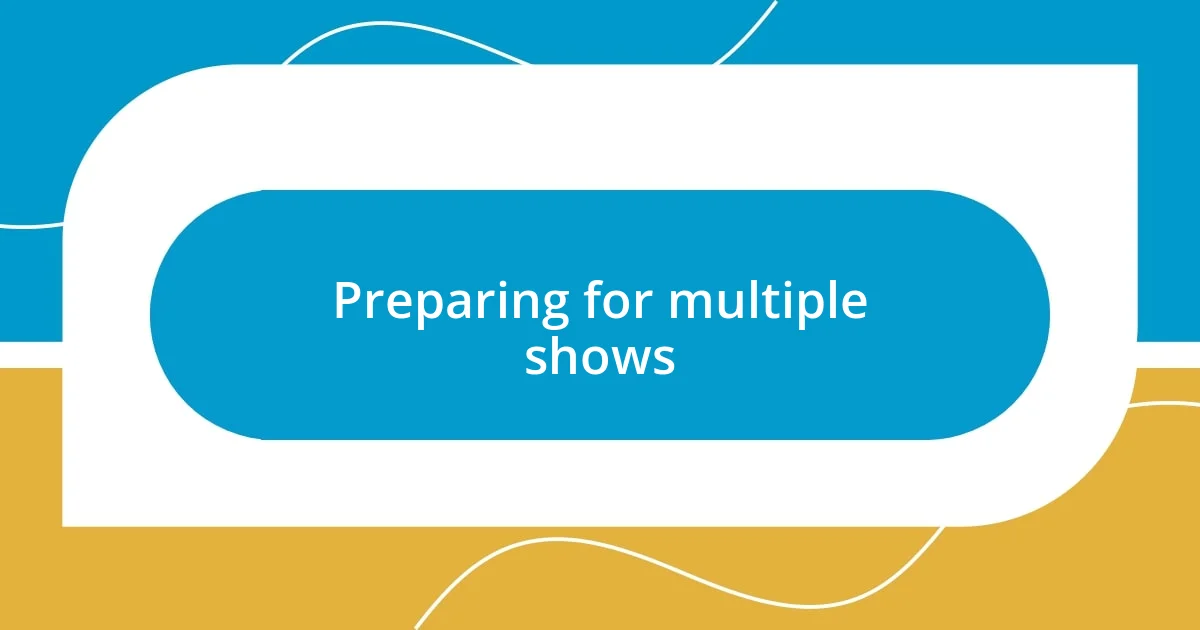
Preparing for multiple shows
Preparing for multiple shows requires a strategic approach to maintain energy and focus. I learned early on that planning ahead can make all the difference. For instance, during one particularly hectic weekend, I scheduled a few relaxing activities between performances—like short walks or deep-breathing exercises. These breaks helped me recharge, providing just enough of a reset to keep me engaged and lively on stage.
Here are some tips I found helpful when preparing for multiple shows:
- Create a Detailed Schedule: Know when you’re performing, rehearsing, and resting.
- Stay Hydrated: Drinking plenty of water keeps your energy up; I can’t stress this enough!
- Nutritious Snacks: Pack healthy snacks to fuel your body between shows.
- Vocal Warm-ups: Even when busy, don’t skip those warm-up routines—your voice will thank you later.
- Mental Breaks: Use downtime to meditate or visualize a glowing performance; it’s a game-changer.
By adopting these strategies, I’ve been able to approach back-to-back performances with a clearer mind and better physical readiness.
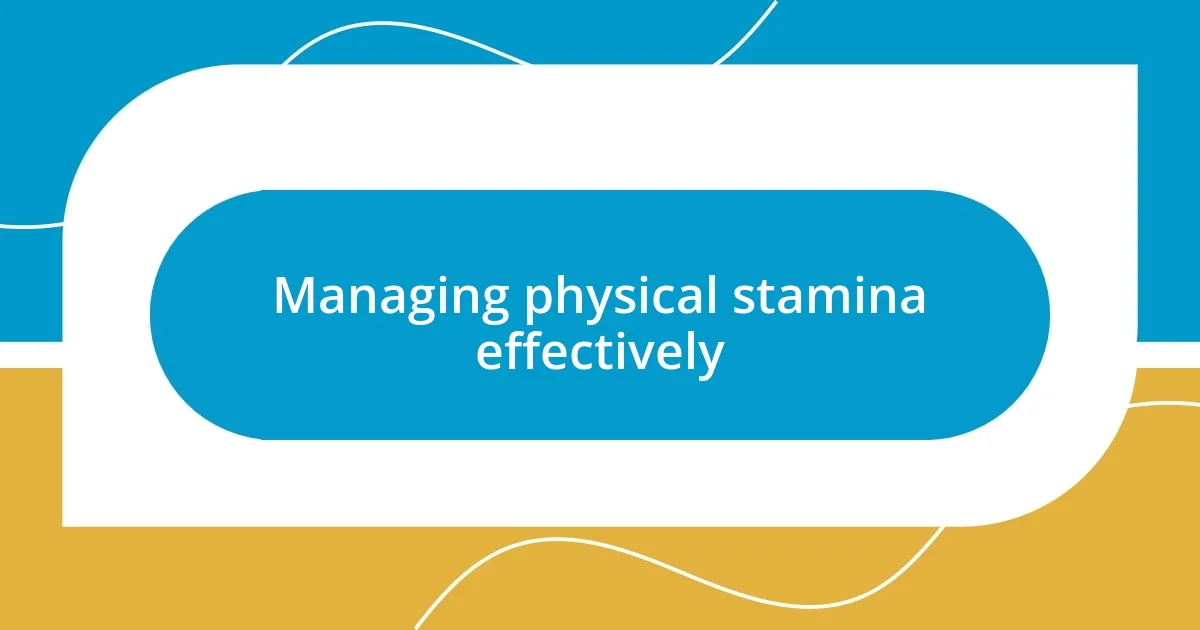
Managing physical stamina effectively
Managing physical stamina during back-to-back performances can feel like an intricate balancing act. I recall a time when I faced back-to-back gigs that left me breathless yet buzzing with excitement. In those moments, I found that listening to my body was crucial. When fatigue gnawed at my energy level, taking a few minutes to stretch and breathe deeply did wonders. This simple practice allowed me to reset and return to the stage feeling refreshed and ready, rather than worn out.
I’ve also discovered that pacing my performances can be a game-changer. Instead of unleashing my full energy in the first show and exhausting myself, I learned to distribute my efforts more effectively. There was a show where I intentionally slowed my energy during the quieter moments, allowing me to explode with enthusiasm during the high-energy parts. It felt as though I tapped into a reservoir of stamina I didn’t know I had—what a revelation! Can you relate to managing your energy in such a way?
Rest is another element often overlooked. I remember one particularly grueling weekend where I had three performances lined up, yet I chose to find brief moments of stillness—sitting quietly backstage, listening to calming music, or even drifting into a short power nap. Those moments provided the recharge I desperately needed. It’s fascinating how just a few minutes can significantly shift your stamina. Ultimately, developing a keen awareness of when to push forward and when to pause has been vital to my success in navigating multiple performances.
| Strategy | Personal Insights |
|---|---|
| Listen to Your Body | I once was so exhausted that I felt like I could barely move. After a quick stretch and breath, I felt a surge of energy that surprised me. |
| Pacing Your Energy | |
| Prioritize Rest | I’ve often found that even a few minutes of calm can reenergize me. Short breaks truly can be the secret to longevity in performances. |
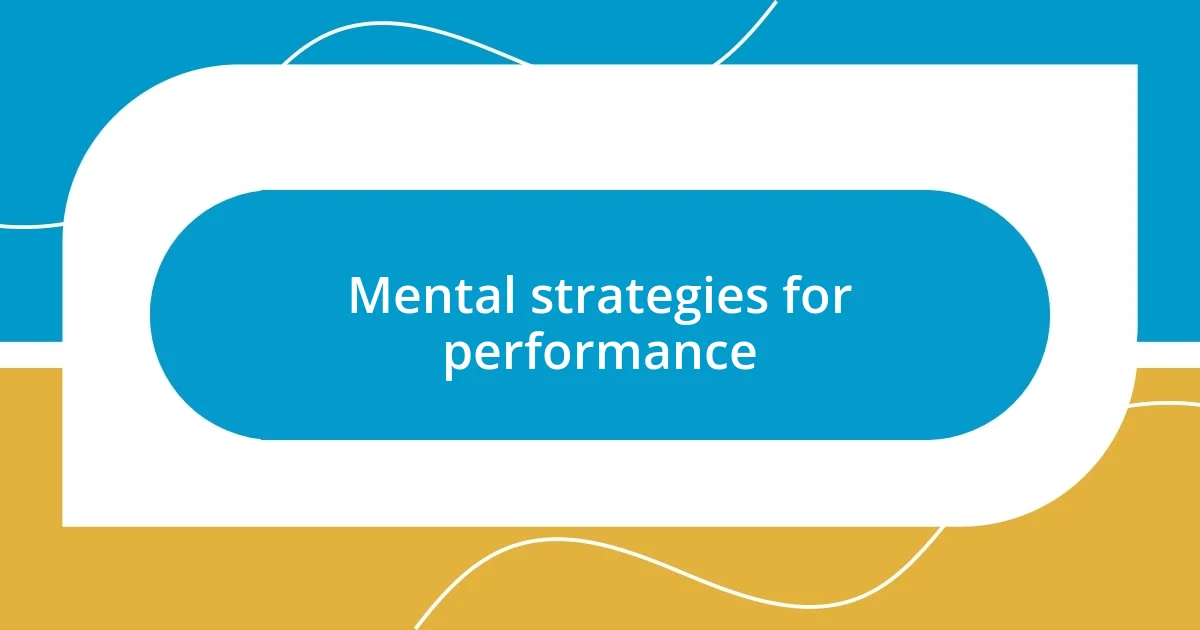
Mental strategies for performance
I often remind myself that mental strategies can be just as significant as physical ones when it comes to performance. One technique that stands out for me is visualization. Before each show, I take a moment to close my eyes and imagine every aspect of my performance, from the lights hitting my face to the audience’s energy. This mental rehearsal not only bolsters my confidence but also helps me feel more in control. Have you ever tried visualizing success before stepping on stage? It can truly transform your mindset.
Another practice that has been invaluable for me is positive self-talk. During intense back-to-back performances, I’ve caught myself spiraling into doubt, especially when fatigue sets in. At that moment, I shift my inner dialogue. Instead of saying, “I can’t do this,” I remind myself, “I’ve prepared for this, and I’ve got this!” Such affirmations have helped me push through challenging moments and emerge stronger. When was the last time you encouraged yourself with positive words? It’s powerful.
I also find great value in mindfulness. Whether through brief meditation or simply being present in the moment, cultivating mindfulness calms my racing thoughts and centers my focus. I recall a particularly hectic performance where I felt overwhelmed. Pausing to take deep breaths and ground myself allowed me to reconnect with the joy of performing. What methods do you use to stay centered? Embracing mindfulness can be a game-changer in maintaining mental clarity and resilience.
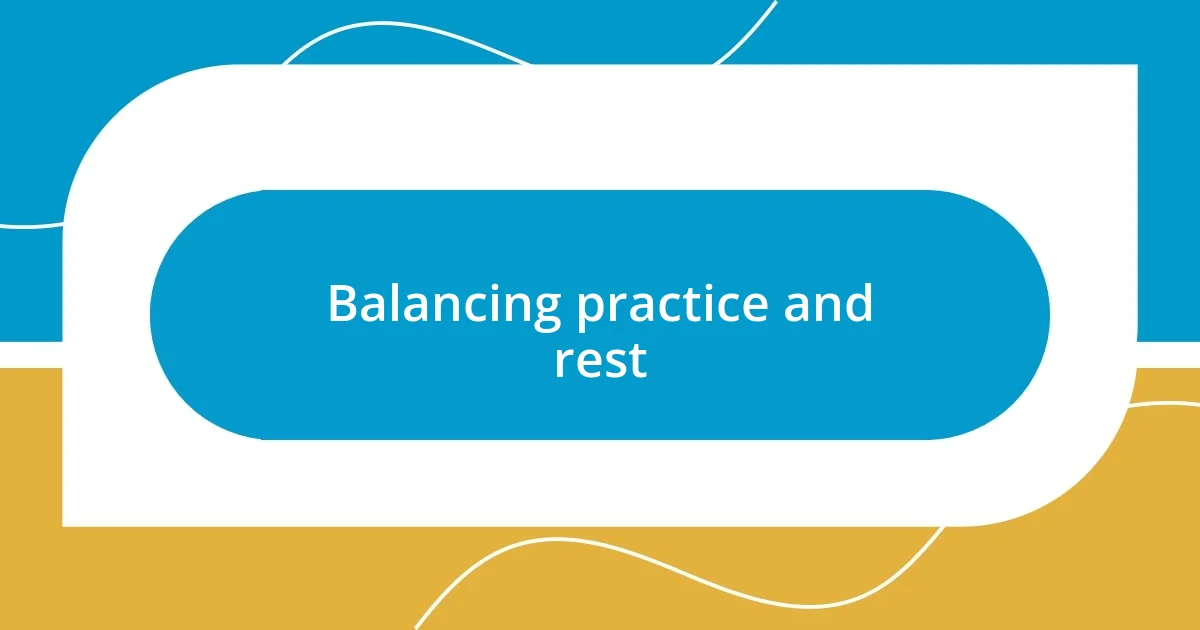
Balancing practice and rest
I’ve come to appreciate that rest isn’t just a luxury; it’s a necessity for performance. After a long rehearsal marathon, I found myself feeling drained, almost like a balloon losing air. That’s when I decided to take a step back. Instead of pushing through the fatigue, I allowed myself a quiet moment to sip some herbal tea and simply breathe. It was like hitting a reset button for my mind and body. How often do you give yourself that kind of break amidst chaos?
And then there’s the art of practice. Balancing it with rest was a lesson I learned the hard way. I remember vividly a time when I crammed in rehearsals right before a big show, thinking that nonstop practice would yield better results. But walking out on stage to perform was excruciating; my body had nothing left to give. Since then, I’ve understood that effective practice is about being intentional and knowing when to step back. Doesn’t it make more sense to practice mindfully and then recharge than to burn out before the big day?
Finding that equilibrium between honing my craft and resting has transformed my performances. I now schedule deliberate downtime into my preparation routine. It’s amazing how just a few hours of rest can bring clarity and creativity. In one of my most memorable performances, I felt rejuvenated thanks to a good night’s sleep the day before. I was alert, engaged, and fully present. Have you noticed how a little more balance in your routine can elevate your performance? It’s a game-changer, and I can’t stress its importance enough.
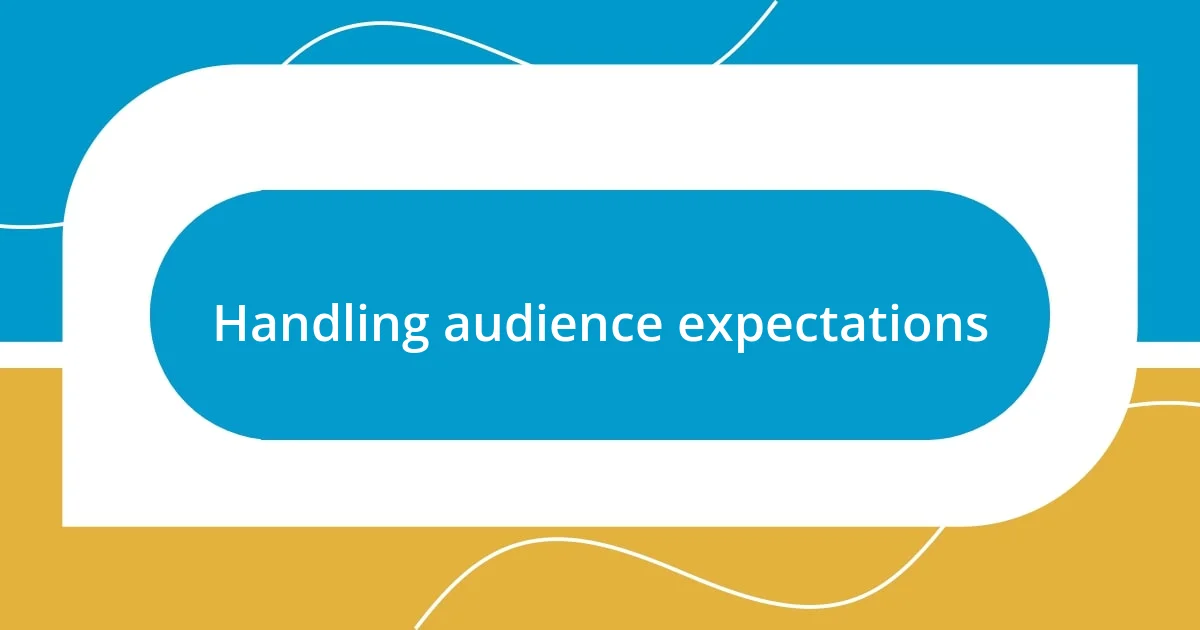
Handling audience expectations
Handling audience expectations is a delicate dance that I’ve learned to navigate over the years. There was a performance during a local festival where the crowd was buzzing with excitement. I could feel their energy as I stepped onto the stage, and it hit me—I had to match their expectations. Instead of succumbing to pressure, I reminded myself that the audience craved authenticity above all else. It’s reassuring to think that my goal isn’t to please everyone but to stay true to my performance. Have you ever felt that kind of expectation weighing on you?
During those back-to-back performances, I often faced the challenge of wanting to give my best while also combating fatigue. One night, I had a particularly demanding set, and I could sense that some in the audience were yearning for something extraordinary. I took a moment to look out at their eager faces and decided to incorporate a spontaneous interaction. Asking them to sing along lifted both my spirits and theirs, creating a unique connection. In those moments, I realized that handling their expectations wasn’t solely about delivering a flawless performance but about embracing the shared experience. How can you engage your audience in ways that exceed their expectations?
The vulnerability of performing can be daunting, especially when you feel the weight of audience anticipation. I vividly recall standing backstage before a show, hearing the audience’s roar and thinking, “What if I fall short of their excitement?” It was in that moment of doubt that I learned to shift my perspective. Instead of focusing on expectations, I began to embrace the concept of creating memorable moments together. Once I let go of perfection, I could genuinely enjoy the experience—I was there to share my passion, not just to meet expectations. Does this resonate with your experiences? Balancing audience anticipation with my authentic expression has become a key part of my performances, and it’s one of the most rewarding aspects of being on stage.
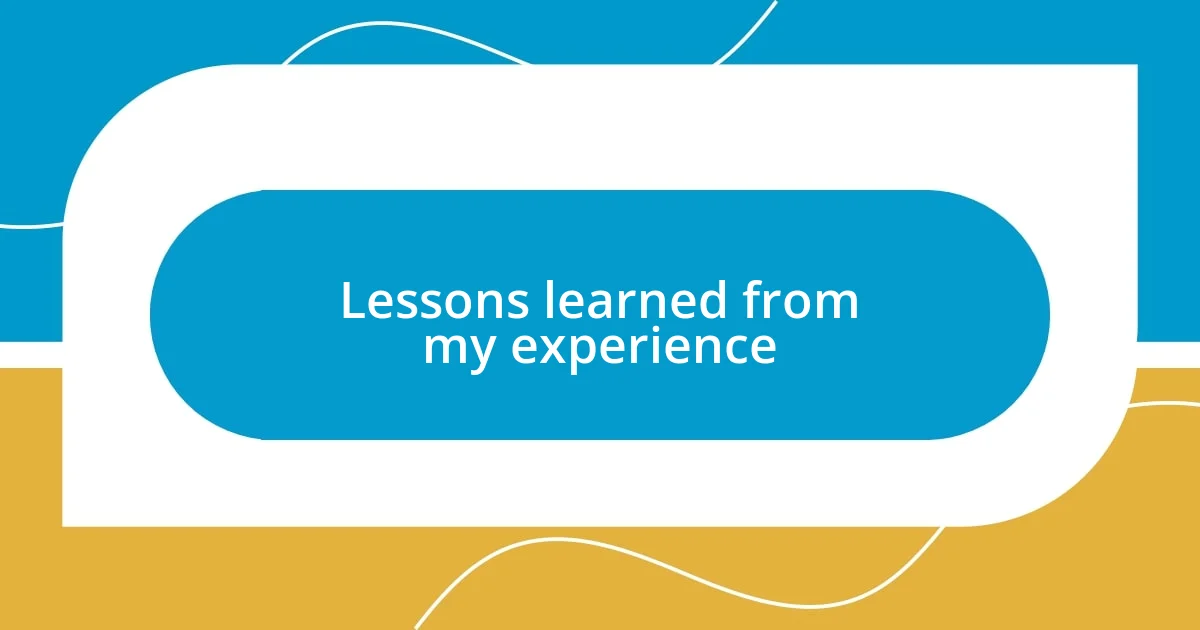
Lessons learned from my experience
Navigating the whirlwind of back-to-back performances taught me the significance of setting realistic goals. I remember one particularly ambitious weekend where I aimed to deliver an explosive performance each night. By the end of the second show, I felt like I was running on fumes. It became clear that I needed to balance my ambition with my current capacity. Have you ever set lofty expectations only to realize they were too much? Adjusting my goals allowed me to channel my energy into each performance more effectively, ensuring that I truly delivered rather than just going through the motions.
I also discovered the importance of flexibility. There was a night where technical issues threatened to derail the entire show. Instead of panicking, I improvised, sharing a few behind-the-scenes stories with the audience. This unplanned moment transformed the atmosphere and allowed me to connect with them in a way I hadn’t anticipated. Isn’t it fascinating how unexpected detours can lead to richer experiences? I learned that being open to change can turn potential setbacks into delightful surprises, enhancing my performances.
Lastly, I’ve gained a deeper understanding of self-compassion. There were nights when I left the stage feeling disappointed, caught up in self-critique. One particularly tough evening, after the show, I took time to reflect rather than chastise myself. I recalled the joy of performing and the moments that resonated with the audience. Have you ever been too hard on yourself, forgetting the bigger picture? Embracing self-compassion has shifted my mindset from purely results-oriented to valuing the journey. This shift has not only improved my mental well-being but also enriched my performances.












